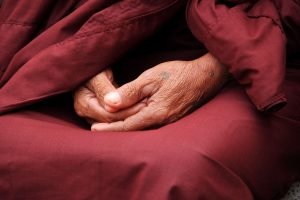
Burmese-Pali Manuscript.
Credit: Wellcome Library, London. Wellcome Images
images@wellcome.ac.uk
If you read enough Buddhist literature you will realise there is not just one Dhamma. The Dhamma that the Buddha taught is not the only one! This can come as a shock to some people but it need not be that way. Everything, from the smallest atomic particle, to the entire universe has its own Dhamma. Every individual person on our planet has their own Dhamma. The roses in you garden, the aphids that attack them and the treatment for those aphids that you use have their own Dhamma. Even your settee has its own Dhamma.
How can this be so?
Dhamma basically means “the way things are”. It’s as simple as that. The Buddha taught Dhamma on a global and cosmic scale, as well as on the day-to-day life scale. He taught how the world works, how suffering is the nature of this world in which we live, and how to escape from that suffering. That is his Dhamma. He taught the Dhamma of this three-dimensional reality. He taught its impermanence, it’s unsatisfactorinss and it’s escape. If we wish to escape suffering, then we best follow his teachings, otherwise we will only end up back here, or worse, if we do not.
Dhamma
Dhamma is how things are. It is their pure nature, it is their fundamental reality. Dhamma explains exactly what makes up the thing in question. Tied in with the concept of Dependent Origination, which is another fundamental concept, you can, with enough practice, understand the true nature of anything you put your mind to. The two concepts may seem difficult to understand at first glance, and I will cover Dependent Origination in a future post, but once you have grasped them, nature falls into place quite easily.
Dhamma does not have to be difficult. At it’s essence, it is incredibly simple, which is why the ‘Breath Meditation’ practice is so simple. Simple practices lead to the realisation of simple concepts. They lead to those ‘Ah! That’s how it is!’ moments. Those moments are another step closer to final liberation.
A friend of mine once told me she had been taught a meditative technique that involved watching a pebble grow. Now I never quite got that at the time, but it would be a wonderful practice now. To actually see a pebble grow does not mean you see it get bigger, but it means you see it’s nature and reality as it really is, thus the pebble becomes more than your mind thought it to be in the first place. The pebble is, basically, a pebble, but your understanding of that pebbles nature grows over time. You could use your settee, oven, fridge, best mate or the leader of your country as the subject of your meditation, but a pebble is nice and simple. It will yield the same results thus negating any emotional complications in your practice.
End Notes
As I said earlier, Dhamma explains the way things are. Atoms do what they do, cells do what they do, people do what they do, even nations do what they do. The world exists in the only way it can because of the nature of this three-dimensional reality. The human rebirth leads us to do what we do, whomever we are, and thus suffering takes place. Kamma acts in the way it needs to, whether good or bad, and 99% of the time no-one has a clue that this is the cause of their situation. To escape this round of rebirth and suffering one needs to follow the Buddha’s teachings. It may not happen in this lifetime, or the next, but if you start practicing now, then you have taken the first steps on the road to freedom.
Namaste
 The Dhamma of Cats: Cats are a great indicator of various aspects of the Dhamma. Don’t get me wrong, dogs are just as good,; I just happen to own cats.
The Dhamma of Cats: Cats are a great indicator of various aspects of the Dhamma. Don’t get me wrong, dogs are just as good,; I just happen to own cats.

